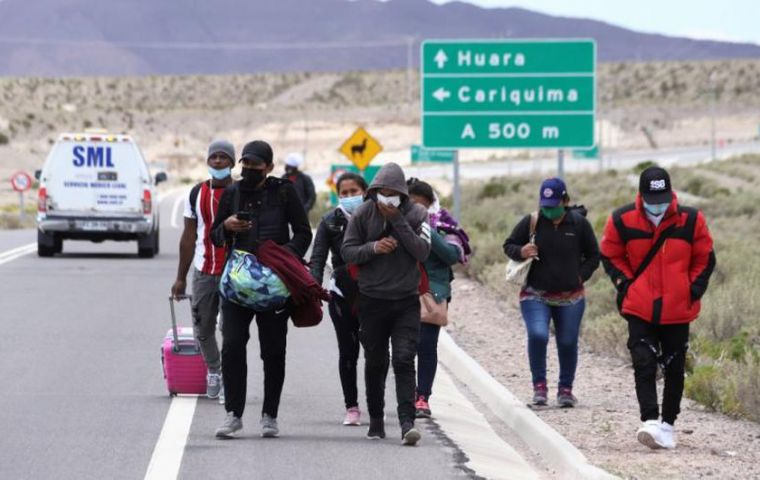MercoPress. South Atlantic News Agency
Irregular migration and drug trafficking alongside Bolivia-Chile border keeps drawing concern
 Chile has ordered the deployment of additional Carabineros troops to watch out for undocumented migrants
Chile has ordered the deployment of additional Carabineros troops to watch out for undocumented migrants While Chile's presidential delegate at Tarapacá, Miguel Ángel Quezada, accused Bolivia on Thursday of “not making any effort” to prevent the crossing of irregular migrants through the common border, authorities from both countries have formed four working groups to coordinate the fight against drug trafficking.
The four teams will also tackle the money laundering ensuing the illegal distribution of narcotics, Bolivian Vice-Minister of Social Defense and Controlled Substances, Jaime Mamani announced Thursday.
Quezada claimed in a radio interview that Bolivia did not help Chile control the irregular flow of migrants, especially Venezuelans as the business of “coyotes” was on the rise.
In that scenario, Quezada justified the settling of a Carabineros camp in Colchane announced Wednesday by Interior Minister Rodrigo Delgado. The goal of increasing police presence in the area is to ensure that officers take turns to keep it functioning around the clock.
“We have 300 kilometers of border with Bolivia, and Bolivia does not make any effort so that people do not cross.” Quezada insisted. In his opinion, immigration control is “a challenge for South America.”
But given that most of migrants are Venezuelan, Quezada also pointed fingers at ”the social, economic and political crisis of the dictatorship of (Venezuelan President Nicolás) Maduro.“
Chile has been hit by cases of violent xenophobia over the past few weeks due to the arrival of scores of needy Venezuelans. “We have to enter into a discussion regarding what we want for Chile in the issue of migration,” Quezada stressed.
Meanwhile, Mamani explained also in a radio interview that drug trafficking does not stop at the borders. “Today the eleventh meeting of the Bolivia-Chile Mixed Commission on drugs and related issues began. The drug trafficking problem is a multilateral and multidimensional problem that is part of transnational organized crime and that affects the entire world,” he underscored.
He also explained that four working groups were made up to handle a permanent information exchange on new trends and routes for the trafficking of controlled substances, while coordinating simultaneous operations in border regions, together with joint control of currency exchange operations among other tasks.




Top Comments
Disclaimer & comment rulesCommenting for this story is now closed.
If you have a Facebook account, become a fan and comment on our Facebook Page!